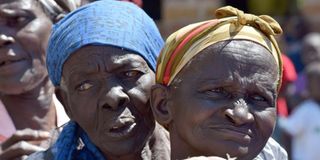Remember elderly women in campaign to end GBV

Elderly women displaced by floods in Homa Bay County wait for relief food distributed by Devolution CS Eugene Wamalwa in 2018.Communities must treat older women with care and respect.
What you need to know:
- Violence against older women is widespread, with perpetrators ranging from intimate partners, family members, caregivers, and community members.
- Covid-19 containment measures have left, and continue to leave older persons alone, separated from caring kin who would otherwise often check in on them and ensure their wellbeing.
- Ending SGBV against older women will take a concerted effort.
Maria is an 84-year-old widow from Riruta Satellite, a low-income suburb in Nairobi. She is a mother of five children, two sons and three daughters. Her husband died three years ago, leaving her with the family property that included unoccupied land and some rentals.
Shortly afterwards, she shared the property among her children as part of their inheritance and retained a portion as a source of income. Her youngest son was, however, unhappy with the division of property and maintains that his sisters have no rights to the property.
He became hostile and violent towards his mother, intending to directly collect the rent from the rentals. He has now threatened to kill his mother and sisters to take over ownership of the property.
Violence and ageism
Unfortunately, Maria’s story is just one of many. Violence against older women is widespread, with perpetrators ranging from intimate partners, family members, caregivers, and community members.
As we draw to the end of 16 Days of Activism Against Gender-Based Violence, an annual international campaign to challenge violence against women and girls, we must reflect on and galvanize action around the need to better protect older women like Maria from all forms of violence and ageism (the targeting of older persons on the basis of their age).
Before the Covid-19 pandemic, the World Health Organization estimated that one in six older people- those above the age of 60 - globally, were subjected to abuse in 2019. This was spurred by factors including alcoholism and property ownership disputes, among other issues.
Emerging evidence indicates that the abuse has sharply increased in many countries as a direct result of the pandemic.
Covid-19
Consider the containment measures instituted by governments to flatten the Covid-19 curve; the need for social distancing that culminated in the partial cessation of movement and in some instances, full lockdowns, have left, and continue to leave older persons alone, separated from caring kin who would otherwise often check in on them and ensure their wellbeing.
This exposes them to rogue community members, relatives and caregivers who use the opportunity to exercise their control and abuse, particularly against older women.
A report by the Social Science Research Council indicates that Kenya is among the countries reporting a 30 per cent to 50 per cent average increase in sexual and gender-based violence (SGBV) amid lockdowns. This harrowing statistic encompasses SGBV against older persons. What is worse is that victims rarely report the abuse for fear of victimisation. A vicious cycle is, therefore, established, fuelled by ageism and sustained by the inaction of the government and communities.
HelpAge International Africa continues to work with communities to support them to recognize and prevent SGBV against older women and help them access safety and response services. This includes access to counselling and legal advice for survivors. We also provide older people with the information they need to seek support in case of abuse.
Violence and abuse
Additionally, we continue to advocate for laws and policies to protect older women from violence, abuse, and neglect. One such law is the Protocol to the African Charter On Human and Peoples’ Rights on the Rights of Older Persons in Africa. This law provides for, among others, the right to property inheritance by older women; their protection from all forms of violence and abuse, including those emanating from harmful traditional practices; and the provision of care and support. Four years since the adoption of the Protocol, Kenya is yet to ratify it, leaving the rights of older persons in the balance.
Ending SGBV against older women will take a concerted effort. The government should ratify and implement the African Union Protocol on the Rights of Older Persons. Additionally, it must fully implement existing legislation that protects the rights of older women, including increasing budgetary allocation towards the protection and promotion of their rights.
Communities must also treat older women with care and respect. Ageing is not an event but a process that starts at birth. It is, therefore, imperative that we collaborate in putting an end to the mistreatment of older persons including SGBV against them.
The writer is the Africa Regional Director, HelpAge International.




